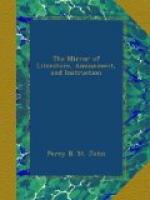Sir J. Malcolm’s History of Persia.
* * * * *
THE COSMOPOLITE.
* * * * *
We love an occasional stroll into the environs of London—on foot—and alone. On foot, because we hate the machinery of a coach—and alone, because we have only our own leisure to consult, and there is no time lost in “making up minds.” On such occasions we have no set object in view, but we determine to make “good in every thing.” A book, great or small, is then to us a great evil; and putting a map into one’s pocket is about as absurd as Peter Fin’s taking Cook’s Voyages on his journey to Brighton. We read the other day of a reviewer who started from Charing Cross with a blue bag filled with books for his criticship: he read at Camberwell, and he read at Dulwich—he wrote in the sanded and smoke-dried parlour of the Lion, the Lamb, or the Fox—and he wrote whilst his steak was grilling at the auberge at Dulwich—and he went home in a hackney-coach: “Lord how he went out—Lord how he came in.” Another brother talks of rambling in a secluded village field with Gilbert White’s “Natural History of Selborne,” or the “Journal of a Naturalist,” in his hand. All this is very pleasant and mighty pretty; but it is not true; and we stake our critical character that neither Gilbert White nor our “Naturalist” did such things, or if they did, that they were not essential to their writings. Making notes and comparing them with others, after a long walk, is another matter; but to walk out into the country to read a book on natural philosophy is not indicative of a susceptible mind. For our own part, we want no book but the broad volume of Nature—but to derive profit as well as pleasure, we must go out with some of the philosophy of Nature in our hearts—for walking is like travelling, (which is only a long walk,)—“a man must carry knowledge with him, if he would bring home knowledge.” We think Mr. Hazlitt talks of lying a whole day on Salisbury Plain as one of his greatest enjoyments, and he is doubtless sincere. When we set out on such a walk as we are about to take, with the reader’s consent, we quote Thomson for our exordium:—




